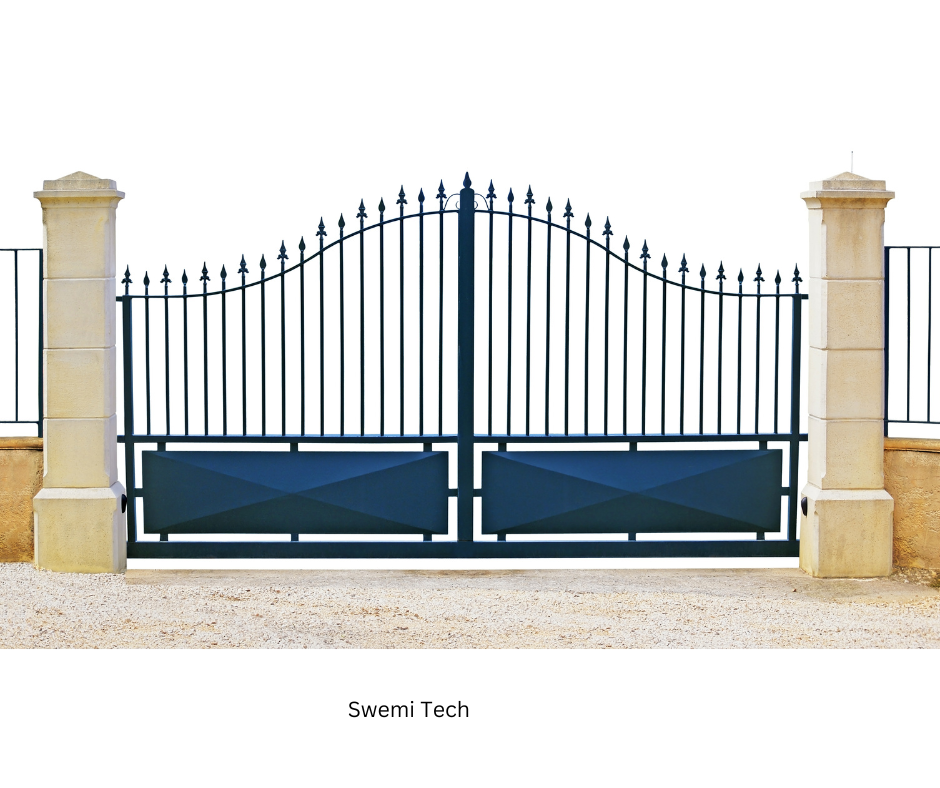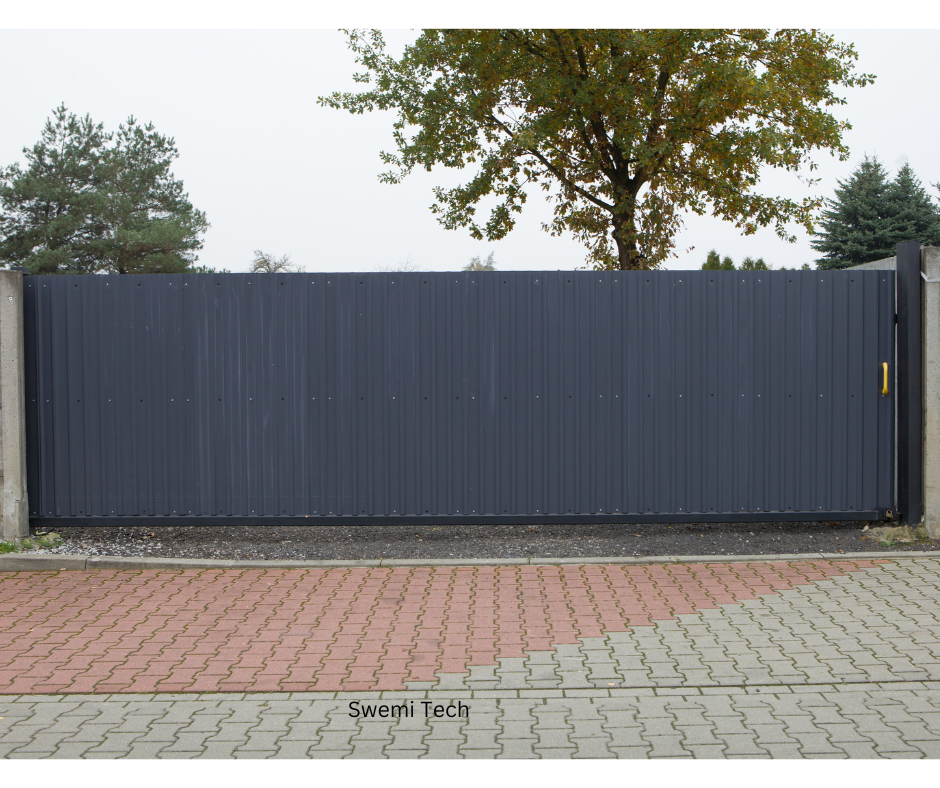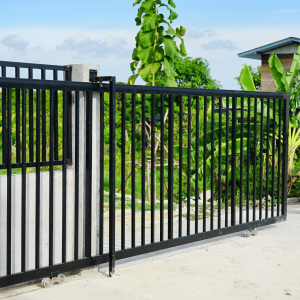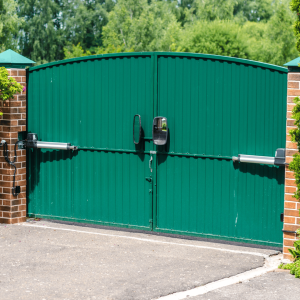Is your property truly secure? With rising concerns about security across Kenya, having a robust gate system is more crucial than ever. Recent statistics reveal that residential and commercial break-ins increased by 12% in Kenya last year alone, highlighting the need for enhanced security measures. Automated gates in Kenya, also known as electric gates, offer much more than a physical barrier—they provide advanced security features like integrated alarms, surveillance systems, and smart access controls that can be tailored to your specific needs.
Imagine the convenience of controlling your gate remotely with just a tap on your smartphone or setting it to open automatically during specific hours. Whether you’re a homeowner looking to elevate your property’s security and curb appeal or a business owner seeking to streamline access control, an automated gate from Swemi Tech can be a game-changer. Our gates are designed not just for functionality but also to blend seamlessly with your property’s aesthetics, offering both security and style.
At Swemi Tech, we specialize in providing cutting-edge automated gate solutions tailored for the Kenyan market. Our systems integrate with the latest technology, including smart home systems and automatic lighting, ensuring your entrance is as modern and secure as the rest of your property. Investing in an automated gate isn’t just about keeping intruders out; it’s about enhancing your lifestyle, protecting your assets, and adding long-term value to your property.
Types of Automated Gates in Kenya.
Swing gates.

Swing gates are a popular type of automated gate in Kenya, known for their classic operation style and versatility. Here are their characteristics and advantages:
Characteristics of Swing Gates:
- Operation Mechanism: Swing gates operate by swinging open and closed, much like a standard door. They can be single-leaf (one gate panel) or double-leaf (two gate panels).
- Space Requirement: These gates require sufficient space to swing inward or outward, making them ideal for properties with ample driveway space.
- Design Variability: Swing gates come in various designs, from simple, sleek styles to more ornate, decorative ones, catering to different aesthetic preferences.
- Material Options: They can be constructed from a range of materials, including wood, metal, and even combinations of different materials for enhanced aesthetic appeal.
- Automation System: The automation typically involves electric swing gate operators, which can be controlled via remote control, keypad, or smartphone app.
Pros of Swing Gates:
- Aesthetic Appeal: Swing gates often have a more traditional and elegant appearance, which can significantly enhance the curb appeal of a property.
- Ease of Installation: Compared to other types of automated gates in Kenya, swing gates can be easier to install as they often require less structural modifications.
- Variety of Designs: Their versatility in design allows them to fit a wide range of architectural styles, making them suitable for many homes and commercial properties.
- Reliability: Swing gates are known for their reliability and long lifespan, especially when properly maintained.
- Safety Features: They can be equipped with safety sensors to prevent accidental closing when there is an obstruction, making them safe for homes with children and pets.
- Energy Efficiency: Swing gates generally consume less power in operation compared to other automated gate types.
- Customization: They offer a high degree of customization in terms of size, material, and design to meet specific preferences and requirements.
Sliding gates.

Sliding electric gates are a popular type of automated gate in Kenya, known for their space-saving design and efficiency. Some of their outstanding features include;
- Design: Sliding gates typically move horizontally on a track laid across the gate opening. They come in various styles, from solid panels to ornate designs, catering to different aesthetic preferences.
- Space Utilization: Ideal for properties with limited space, as they require no extra room to swing open. They slide parallel to the fence or wall, making them suitable for driveways with steep inclines or limited frontage.
- Mechanism: Operated using a track and roller system, sliding gates are powered by a gate motor. This motor can be tailored to the gate’s size and weight, ensuring efficient operation.
- Material: Commonly constructed from durable materials like steel or aluminum, which offer strength and resilience against weather conditions.
- Automation Features: Often equipped with sensors, remote controls, and security features like automatic locking, intercom systems, and integration with home security systems.
Pros of Sliding Gates in Kenya:
- Enhanced Security: Slide gates are robust and difficult to force open, providing a high level of security. The automated features of the automatic sliding gate allow for controlled access, enhancing the safety of the property.
- Space-Efficient: Since they don’t require space to swing open, automatic sliding gates are ideal for properties with limited space, such as urban homes or commercial buildings in densely populated areas.
- Durability: Automatic sliding gates are made from sturdy materials, they are built to withstand the Kenyan climate, offering long-term durability with minimal maintenance.
- Convenience: Automated sliding gates offer ease of access. With remote controls, residents can open and close the gate without leaving their vehicle, a significant advantage during inclement weather or late-night arrivals.
- Aesthetic Appeal: Available in a range of designs, automatic sliding gates can be customized to complement the architectural style of the property, enhancing its curb appeal.
- Increased Property Value: Installing a sliding automated gate in Kenya can increase the property’s market value, making it an attractive feature for potential buyers or renters.

-
Product on sale
 Electric | Automated Sliding Gate InstallationOriginal price was: KSh105,000.KSh98,000Current price is: KSh98,000.
Electric | Automated Sliding Gate InstallationOriginal price was: KSh105,000.KSh98,000Current price is: KSh98,000. -
Product on sale
 Electric | Automated Swing Gate InstallationOriginal price was: KSh150,000.KSh135,000Current price is: KSh135,000.
Electric | Automated Swing Gate InstallationOriginal price was: KSh150,000.KSh135,000Current price is: KSh135,000.
Benefits of Installing Automated Gates.
Installing automated gates rather than the normal gate offers numerous benefits, making them a popular choice for property owners. Here are some key advantages of gate automation.
- Enhanced Security: Automated gates provide a substantial barrier to unauthorized entry, significantly improving the security of your property. The integration of features like coded keypads, intercoms, and surveillance cameras further strengthens this aspect.
- Increased Property Value: Properties with automated gates often see an increase in market value. The perception of increased security and the aesthetic appeal of these gates make the property more attractive to potential buyers or renters.
- Convenience and Ease of Use: Gate automation offers the convenience of remote operation, allowing you to open and close the gate without physically doing so. This feature is particularly beneficial in adverse weather conditions or when security concerns dictate that you should not leave your vehicle unattended.
- Safety for Children and Pets: These gates can help keep children and pets safely enclosed within your property, reducing the risk of them wandering onto busy roads or getting lost.
- Privacy: Automated gates limit access to your property, providing a physical barrier to unwanted visitors and passersby, thus enhancing your privacy.
- Reduced Insurance Premiums: Some insurance companies offer lower premiums for properties with enhanced security features like automated gates, recognizing the reduced risk of burglary and trespassing.
- Aesthetic Appeal: Automatic sliding gates come in various designs and materials, allowing you to choose one that complements the style of your property and enhances its curb appeal.
- Long-Term Cost Savings: While the initial investment might be significant, automated gates are durable and typically require minimal maintenance, leading to cost savings in the long run.
- Controlled Access: With automatic gates system, you have complete control over who enters your property, which is especially important for businesses or residential properties that need to monitor access.
- Peace of Mind: Knowing that your property is well-protected provides a sense of comfort and peace of mind, which is invaluable.
Automated gates in Kenya are therefore not just about security; they also offer convenience, safety, privacy, and can even be a financially beneficial investment in the long term.
Components of Automated Gates in Kenya.
Automated gate systems, particularly in Kenya, comprise several key components that work together to ensure efficient operation, security, and convenience. Here’s a breakdown of these components:
- Gate Motor/Operator: The gate motor is the driving force behind the gate’s movement. It powers the gate’s opening and closing mechanism. The type of motor used varies based on the gate’s design. For sliding gates, a motor that moves the gate along a track is used. For swing gates, the motor typically operates arms or hinges that move the gate. Motors are chosen based on the gate’s size and weight. Larger, heavier gates require more powerful motor.
- Gate Opener: Automatic gate opener refers to the entire system that controls the operation of the gate, including the motor, but also encompasses other components like remote controls, sensors, and the control panel. They vary depending on the type of gate being installed.
Types of Automated Gate Openers:- Sliding Gate Openers: These are used for gates that move laterally along a track. They’re ideal for properties with limited space or where the driveway slopes upwards from the gate.
- Swing Gate Openers: Automatic swing gate openers are used for gates that swing open either inward or outward. They come in single or double gate models, depending on whether the gate has one or two moving parts.
- Articulated Arm Openers: Suitable for gates with wide columns or where the gate needs to open inwards towards a sloping driveway. The arm operates in a folding motion.
- Underground Gate Openers: These are installed beneath the gate, making them less visible and preserving the aesthetic appeal. They are suitable for both swing and sliding gates.
- Power Supply: Automated gates in Kenya require a reliable power source. This can be direct electrical wiring, solar panels, or battery backups, especially important in areas prone to power outages.
- Control Unit/Panel: The control unit is the system’s brain. It acts as the central processing unit that controls the gate’s operations.
- The control unit receives signals from various input devices, such as remote controls, keypads, intercom systems, or access cards.
- It processes these signals and sends commands to the gate motor, instructing it to open, close, stop, or reverse the gate’s movement. This is important especially for emergency situations.
- The unit can be programmed with specific settings like gate opening and closing speeds, hold-open times, and automatic closing functions.
- Remote Controls: These wireless devices allow gate operation from a distance, offering convenience and safety. Remote gates are used especially when arriving or leaving in a vehicle. The remote control communicates with the electric gate opener system.
- Safety Sensors: These sensors detect obstacles in the gate’s path, preventing it from closing on a vehicle, person, or object. They are crucial for preventing accidents and damage.
- Intercom System: For gates at residential or commercial properties, intercom systems allow communication between the gate and the main building, enhancing security by verifying visitors.
- Keypad/Access Control System: These systems require a code or a security card for gate access, offering an additional layer of security.
- CCTV Cameras: Often integrated with automated gate systems, these cameras provide surveillance of the gate area, adding to the security of the property.
- Gate Material: The physical gate itself, made from materials like metal, wood, or a combination, designed to suit specific security needs and aesthetic preferences.
- Tracks and Rollers (for sliding gates): These components guide and support sliding gates, ensuring smooth operation.
- Hinges and Bearings (for swing gates): Essential for the movement of swing gates, these must be robust and well-maintained for smooth operation.
- Lighting: Automated gates often include lighting for visibility and security, which can be motion-activated or timed.
- Backup Systems: In case of power blackout or failures, backup systems like manual overrides or secondary power sources like batteries are critical.
Installation Process for Automated Gates in Kenya.
The installation process for automated gates in Kenya by Swemi Tech, which is always done by certified and experienced automatic gate installers can be outlined in several key steps to ensure efficiency, safety, and customer satisfaction.
- Site Assessment and Planning:
- Initial Consultation: This involves meeting with the client to understand their specific needs, preferences, and security concerns.
- Site Inspection: A professional survey of the property is conducted to assess the space where the gate will be installed, considering factors like the size of the entrance, ground level, and surrounding environment.
- Design and Material Selection: Based on the assessment, the client chooses the gate design and materials (such as steel, aluminum, or wood) that suit their aesthetic and security requirements.
- Preparation of the Site:
- Clearing the Area: The installation area is cleared of any debris or obstructions.
- Groundwork: This includes leveling the ground, laying down the foundation or tracks for sliding gates, and installing posts or pillars for swing gates.
- Gate Fabrication: If the gate is not pre-made, it will be custom fabricated according to the chosen design and dimensions in line with the types of gates available.
- Electrical and Mechanical Setup:
- Installation of the Motor/Operator: The motor unit is installed and secured in place. For swing gates, this might be attached to the gate post, while for sliding gates, it is typically installed on the ground beside the gate.
- Power Supply Setup: Electrical wiring is laid out to connect the gate motor to the main power supply. If a backup system or solar power is used, these elements are also installed.
- Installing the Gate: The fabricated gate is then installed onto its hinges (for swing gates) or onto the track system (for sliding gates).
- System Integration and Access Control Installation:
- Control Panel Setup: The control panel is installed and connected to the gate system.
- Installing Safety Sensors: Infrared sensors or pressure sensors are installed to detect obstacles and prevent accidents.
- Access Control Mechanisms: Keypads, card readers, or biometric systems are installed, depending on the chosen access control method.
- Testing and Calibration: Once everything is installed, the system is thoroughly tested. This includes checking the gate’s opening and closing functions, sensor responsiveness, and remote control operation.
- Training and Handover: The client is trained on how to operate the gate, including how to use the remote controls, access control systems, and what to do in case of a power failure or emergency.
- Final Inspection and Cleanup: A final inspection is conducted to ensure everything is functioning correctly, followed by cleaning up the installation site and make the gate clean.
- After-Service Agreement: Swemi Tech. offers maintenance and repair services post-installation, which include regular check-ups and emergency support.
How much does automated gate installation in Kenya cost?
| Swing Residential | Ksh 138,000 |
| Swing Commercial | Ksh 165,000 |
| Sliding Residential | Ksh 98,000 |
| Sliding Commercial | Ksh 130,000 |
